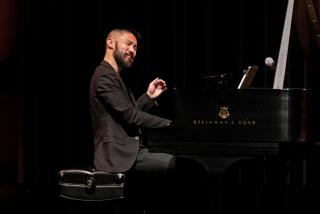GOLD MEDAL SERIES : CELLIST GARY HOFFMAN IN RECITAL
- Share via
Too much thinking can spoil a recipe, a formula or a musical performance. Worrying one’s materials is a good way to bend them out of shape.
Gary Hoffman made that mistake several times during his recital at Ambassador Auditorium, Pasadena, on Monday night. The young American cellist--who last appeared here as soloist with the Pasadena Symphony in November--seldom delivered superstructure and perspective in his program of sonatas by Beethoven, Debussy and Brahms. Instead, he concentrated on details and nuances. The result in each case was a description of the clockworks, not a clear view of the clock face.
Appearing with his colleague from the Indiana University music faculty, pianist Shigeo Neriki, Hoffman displayed many virtues. The prize-winning cellist, now 31, makes a healthy if sometimes slender sound, one of handsome quality. He gets around the instrument with an effortless technique and he articulates his thoughts carefully.
But he seldom projects or communicates the longer musical line, or the urgent emotion. Mostly, he is competent and polite. This performance usually failed to engage the listener, though it offered some special moments. One of these was the opening of Brahms’ E-minor Sonata, where, for once, Hoffmann and Neriki let songfulness and forward motion take over.
Between sonatas, Hoffman played Penderecki’s “Per Slava,” for cello alone (1986), required piece at the last Rostropovich International Competition--which contest Hoffman won. It is a thorny, 5-minute work which the cellist compared, in his spoken program note, to a cadenza. In Hoffman’s genteel performance it sounded more like a meditation, and a rambling one, at that.
More to Read
The biggest entertainment stories
Get our big stories about Hollywood, film, television, music, arts, culture and more right in your inbox as soon as they publish.
You may occasionally receive promotional content from the Los Angeles Times.










